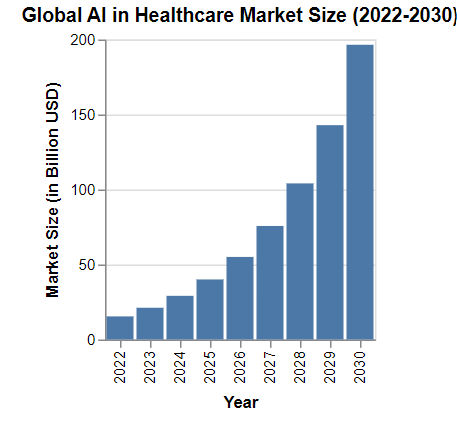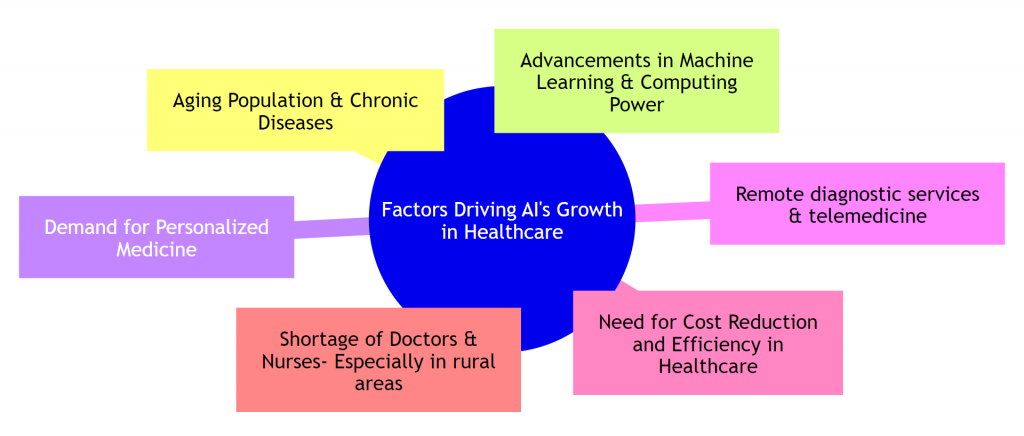How AI is transforming Healthcare
The healthcare industry is undergoing a profound transformation driven by the rapid advancement of artificial intelligence (AI). AI is revolutionizing the way diseases are diagnosed, treated, and managed, with the potential to significantly improve patient outcomes and reshape the future of healthcare.
Statistics Highlighting AI’s Impact on Healthcare
- AI-powered diagnosis is improving accuracy and speed, leading to earlier interventions and improved patient outcomes. A study published in Nature Medicine found that AI algorithms could detect lung cancer with 95% accuracy, compared to 56% by radiologists.
- AI-driven treatment planning is optimizing treatment regimens based on individual patient characteristics and medical data. A study published in JAMA Oncology found that AI could personalize chemotherapy regimens for patients with breast cancer, leading to improved survival rates.
- AI-powered diagnosis is reducing false positives. A study published in the Journal of the American College of Cardiology found that AI could reduce false positives in coronary artery calcium (CAC) scoring by 50%.
- AI has shown significant promise in early diagnosis and risk stratification for chronic diseases, drug discovery, and health system operations. For instance, an AI imaging tool developed by Cedars-Sinai can detect pancreatic cancer up to three years earlier than traditional methods with 86% accuracy.

Applications of AI in Healthcare
- AI-Powered Diagnosis: Enhancing Diagnostic Accuracy and Speed: One of the most significant impacts of AI in healthcare is its ability to enhance diagnostic accuracy and speed. AI algorithms can analyze vast amounts of medical data, including patient history, imaging scans, and laboratory results, to identify patterns and make predictions with greater precision than traditional methods. This enhanced diagnostic capability can lead to earlier detection of diseases, more accurate diagnoses, and more timely interventions, ultimately improving patient outcomes. Nearly three in five physicians believe AI is most useful for addressing chronic diseases, which account for 75% of all U.S. healthcare spending. AI is also being used for early diagnosis of diseases like diabetes, asthma, and depression.
-
AI-Driven Treatment Planning: Personalized Care for Optimal Outcomes: AI is also transforming treatment planning by enabling personalized care tailored to individual patient characteristics and medical data. AI algorithms can analyze patient-specific data, such as genetic information, tumor profiles, and drug response patterns, to predict the most effective treatment options for each individual patient. This personalized approach to treatment planning can lead to improved treatment efficacy, reduced side effects, and enhanced patient quality of life.
-
AI-Powered Patient Monitoring: Early Intervention and Improved Outcomes: AI is playing a crucial role in patient monitoring, enabling continuous surveillance of patient data to identify early signs of deterioration or potential complications. AI algorithms can analyze real-time data from wearable devices, electronic health records, and hospital monitoring systems to detect subtle changes in patient vital signs, medication adherence, and treatment response. This proactive monitoring enables early intervention, preventing adverse events and improving patient outcomes. A study published in JAMA Network Open found that AI could predict readmission with 80% accuracy.
-
AI for Drug Discovery and Development: Accelerating the Pace of Innovation: AI is also transforming the drug discovery and development process, accelerating the pace of innovation and bringing new therapies to patients faster. AI algorithms can analyze vast datasets of molecular structures, clinical trial data, and genetic information to identify potential drug candidates, predict their efficacy and safety, and optimize clinical trial design. This AI-driven approach is leading to faster development cycles, reduced research costs, and increased success rates in drug discovery. A study published in Nature Biotechnology found that AI could reduce the time required to discover a new drug by up to 50%.

Factors Driving AI’s Growth in Healthcare
- Aging Population and Chronic Diseases: The aging global population and the rising prevalence of chronic diseases have increased the demand for continuous health monitoring and long-term care. AI-powered solutions can provide continuous monitoring, early detection of health deterioration, and timely interventions, which are essential in managing chronic conditions effectively.
Advancements in Machine Learning and Computing Power: The advancements in machine learning algorithms and increased computing power have been pivotal in AI’s growth. These technological advancements have enabled the development of more sophisticated AI models that can process complex data sets, learn from new information, and perform tasks with increased accuracy and efficiency.
Demand for Personalized Medicine: There is a growing demand for personalized medicine – treatments tailored to individual patients based on their genetic makeup, lifestyle, and environment. AI’s ability to analyze vast amounts of genetic data and its implications on health conditions is central to the development of personalized treatment plans, making healthcare more effective and reducing side effects.
- Shortage of Doctors and Nurses, Especially in Rural Areas: The shortage of healthcare professionals, particularly in rural and underserved areas, is another critical factor. AI can mitigate this challenge by providing remote diagnostic services, telemedicine, and AI-assisted decision-making, ensuring that quality healthcare is more accessible to those in remote locations.With rising healthcare costs, there is an increasing need for more efficient and cost-effective healthcare solutions.
Need for Cost Reduction and Efficiency in Healthcare: With rising healthcare costs, there is an increasing need for more efficient and cost-effective healthcare solutions. AI can streamline healthcare processes, reduce operational costs, and improve resource allocation, making healthcare more affordable and efficient.
Challenges and Future Outlook
While AI holds immense promise for transforming healthcare, its widespread adoption also presents significant challenges that need to be addressed to ensure its responsible and ethical implementation. Many of these center on building trust, enhancing transparency, and ensuring AI is deployed responsibly and for clearly beneficial purposes. Key challenges include:
1. Ensuring Data Privacy and Security: The vast amounts of sensitive patient data collected and analyzed by AI systems raise concerns about data privacy and security. Robust measures must be in place to protect patient data from unauthorized access, breaches, and misuse. There must be emphasis on protecting patient information and ensuring compliance with regulations like HIPAA.
2. Fostering Trust and Transparency: Calls for transparency around how AI systems are developed, evaluated and validated are growing. The complex nature of AI algorithms and their decision-making processes can make it difficult for healthcare providers and patients to understand and trust their outputs. Transparency in AI development and deployment is crucial to building trust and ensuring that AI systems are used responsibly. Ensuring that AI systems are transparent and their decision-making processes are understandable to healthcare professionals is crucial.
3. Addressing Algorithmic Bias: Algorithmic bias is an important challenge that must be proactively addressed as AI continues expanding across healthcare. Like all software systems, AI algorithms can inherit and amplify biases if the data used to train them reflects historical prejudices or imbalanced representation of certain populations, leading to unfair and discriminatory outcomes. Rigorous methods for bias detection and mitigation are essential to ensure that AI systems are fair and equitable.
4. Ethical Considerations and Human Oversight: The use of AI in healthcare decisions raises ethical concerns about autonomy, informed consent, and the potential for unintended consequences. Human oversight and ethical frameworks are necessary to guide AI development and ensure that it aligns with healthcare principles.
Conclusion
In closing, while AI-driven innovation holds tremendous potential to transform healthcare through augmenting clinical capacities and improving patient outcomes, earning public trust is equally vital for the future. Organizations must develop clear ethical guidelines and principles for AI development and deployment in healthcare to provide a framework for responsible innovation and ensure that AI aligns with healthcare values.
Meeting ethical standards for fair, safe and trusted AI will enable patients and doctors to embrace cutting-edge AI benefits with confidence. Putting people first will allow AI’s exciting potential to uniquely elevate exceptional, cost-effective care as the pinnacle of future medical innovation. By addressing the challenges and embracing the future outlook of AI in healthcare responsibly, we can harness the power of AI to transform healthcare and improve patient outcomes while upholding ethical principles and ensuring that AI is a force for good in the healthcare ecosystem.


